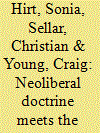|
|
|
Sort Order |
|
|
|
Items / Page
|
|
|
|
|
|
|
| Srl | Item |
| 1 |
ID:
134626


|
|
|
|
|
| Summary/Abstract |
This paper compares how officials in Rousse, Bulgaria, and Transcarpathia, Ukraine, interact with ‘foreigners’: officials from agencies of the European Union (EU), other member states, and foreign consultants. The goals are: a) to compare the extent to which officials in the two communities participate in transnational networks of European bureaucracies, the so-called ‘transnational fusion bureaucracy’; b) to assess the ways in which the bottom-up actions of those officials relate to the broad, top-down policy goals of the EU; and c) to analyse the effects of those interactions on the business environments of the two communities. As a result of comparing the two regions, this paper argues that similar processes of integration in the transnational fusion bureaucracy occur in the internal periphery of the European Union (Rousse) and in areas outside the EU borders (Transcarpathia). In doing so, it questions the extent to which both regions participate in an emerging ‘transnational fusion bureaucracy’ emphasising difference in intensity of the considered processes, as well as the different responses by the two bureaucracies to inputs and opportunities provided by the EU.
|
|
|
|
|
|
|
|
|
|
|
|
|
|
|
|
| 2 |
ID:
162265


|
|
|
|
|
| Summary/Abstract |
Through an historical analysis, this article discusses outward investments promotion as an underexplored aspect of geoeconomics. The empirical focus is on Italy’s institutional support to the internationalization of firms from 1992 to 2015, between the post-socialist transformation of Central and Eastern Europe and the years following the global crisis of 2008. The main argument is that large geopolitical events led to complex interactions between Italy’s firms and policymakers. These interactions reshaped Italy’s geo-economic strategies as well as territorialities. The article identifies the emergence and consolidation of a group of public, semi-public and private actors, thus building a new model of an investment promotion community (IPC). It finds that (a) the IPC emerged to provide an institutional infrastructure necessary to project Italy’s sovereignty beyond national boundaries and (b) in so doing, the elites involved interpreted firms’ needs within broader political issues. Thus, the emergence of the IPC represents a shift from geopolitics to geoeconomics.
|
|
|
|
|
|
|
|
|
|
|
|
|
|
|
|
| 3 |
ID:
122819


|
|
|
|
|
| Publication |
2013.
|
| Summary/Abstract |
THIS COLLECTION EXPLORES HOW NEOLIBERAL IDEOLOGY-and related economic policies-have been implemented in the once-socialist countries of East Central Europe and the former Soviet Union. Specifically, it argues that this ideology undergoes deep modifications as it meets post-socialist conditions: sometimes it is creatively appropriated, sometimes resisted and sometimes 'purified' (in that it is implemented more thoroughly than in the Western nations where neoliberalism as an ideology was developed). Thus, the collection illustrates how 'actually existing neoliberalism', to use Brenner and Theodore's (2002) terminology, occurs 'on the ground'. It argues that the 'actually existing neoliberalisms', which have developed in a variety of post-socialist contexts, can differ profoundly from the theoretical constructs propagated by neoliberalism's supporters, including the major international financial institutions such as the International Monetary Fund and the World Bank. As recent literature on policy mobility makes clear 'It is already widely recognized that it is rarely possible to transfer policies directly, precisely because they emerge from and are responses to particular "local" sets of social and political conditions which are not replicated in the places to which they are transplanted' (Cochrane & Ward 2012, p. 5).
|
|
|
|
|
|
|
|
|
|
|
|
|
|
|
|
|
|
|
|
|